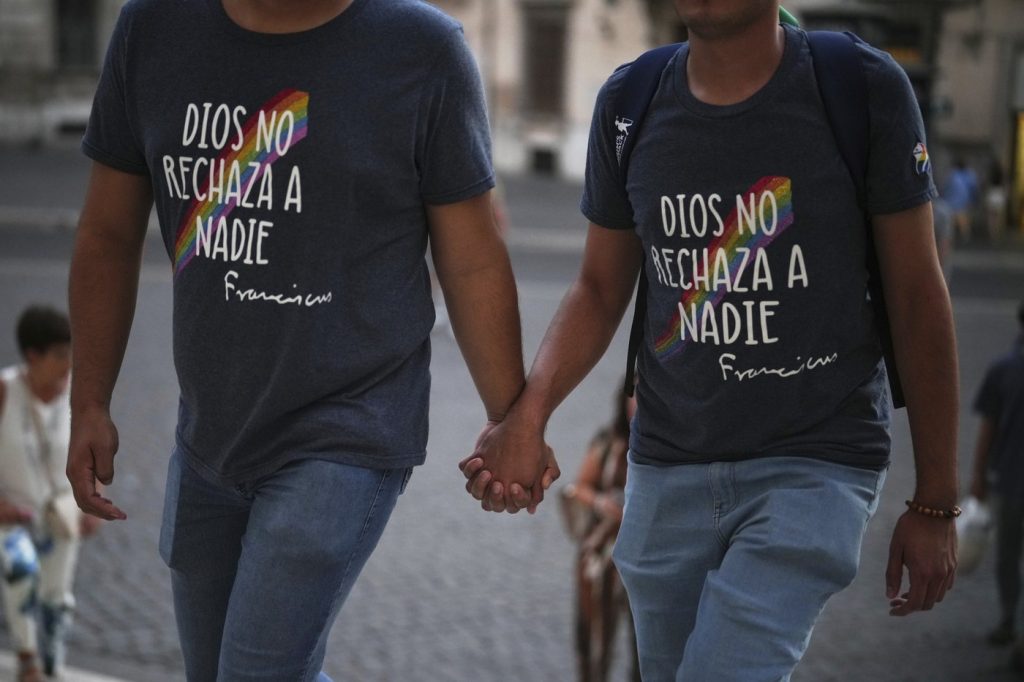VATICAN CITY (AP) — Hundreds of LGBTQ+ Catholics and their families gathered in Rome for a Holy Year pilgrimage, marking a significant moment of acceptance within the Catholic Church. Many pilgrims attributed this newfound inclusivity to the leadership of Pope Francis, who has made strides in welcoming LGBTQ+ individuals into the Church. The pilgrimage took place on a Saturday, coinciding with the Catholic Church’s once-every-25-year celebration.
Bishop Francesco Savino, vice president of the Italian bishops' conference, celebrated Mass for the pilgrims at Chiesa del Gesù, the main Jesuit church in Rome. During his homily, he echoed Pope Francis’s mantra that “everyone, everyone, everyone” should feel welcome in the Church. The event featured participation from several LGBTQ+ groups and was listed in the Vatican’s official calendar of events, although organizers clarified that this did not imply the Church’s endorsement or sponsorship of the pilgrimage.
The primary organizer of the pilgrimage was the Italian LGBTQ+ advocacy group known as "Jonathan's Tent." They collaborated with Outreach, a U.S.-based group founded by the Rev. James Martin, a Jesuit priest and advocate for greater inclusion of LGBTQ+ Catholics. Although Pope Leo XIV held a special Jubilee audience for all pilgrim groups in Rome, he made no specific mention of the LGBTQ+ attendees who planned to walk through the Holy Door of St. Peter’s Basilica later that day.
Many pilgrims expressed feelings of acceptance largely due to Pope Francis's efforts. His approach has differentiated him from his predecessors in fostering a welcoming environment for LGBTQ+ Catholics. From his famous 2013 statement, “Who am I to judge?” regarding a gay priest, to allowing priests to bless same-sex couples, Francis has worked actively towards inclusivity. While he has not altered the Church's teachings on homosexuality, he has promoted the notion that being LGBTQ+ does not equate to wrongdoing.
Participants like John Capozzi, who attended the pilgrimage with his husband, Justin del Rosario, conveyed how Pope Francis's attitude inspired them to reconnect with the Church after feeling ostracized during the 1980s AIDS crisis. Capozzi described the fear of judgment that led him to distance himself from the Church and emphasized how Francis’s message allowed him to embrace his identity as a proud Catholic.
At a vigil service for the pilgrims held at the Church of the Gesù, Capozzi shared his testimony, alongside other LGBTQ+ individuals and allies, including a mother of a transgender child. Rev. Fausto Focosi delivered a poignant reflection, highlighting the tears of rejection once felt by LGBTQ+ Catholics, but now replaced by tears of hope and acceptance.
Pope Leo XIV’s stance on LGBTQ+ issues had raised questions since his election in May, as past remarks from him had suggested criticism of the LGBTQ+ lifestyle. However, upon becoming a cardinal, he acknowledged the need for a more inclusive Church and expressed his intent to continue the policies of acceptance championed by Pope Francis. The two leaders have emphasized the importance of welcoming all individuals, irrespective of their backgrounds or lifestyles.
Both Capozzi and Del Rosario noted the positive influence that Pope Francis and Pope Leo XIV have had on their faith, prompting them to re-engage with Catholicism after periods of absence due to feeling unwelcome. Their testimonies reflect a broader sentiment among LGBTQ+ Catholics, indicating a significant cultural shift within the Church towards greater understanding and inclusivity.
In conclusion, this pilgrimage symbolizes a hopeful future for LGBTQ+ individuals within the Catholic Church, as they continue to seek acceptance and community under the leadership of progressive papacies. This sense of welcome, which has started to permeate the Church, marks a transformative moment in the lives of many believers.










